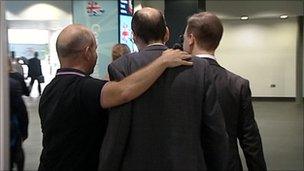Andrew Tyrie and Steve Hilton: Revisiting that meeting
- Published

Steve Hilton put his arm round Andrew Tyrie's shoulder as they held their conversation
Politics - like life - is never as simple as it seems.
Take for example the encounter between the Conservative MP Andrew Tyrie and the prime minister's head of strategy, Steve Hilton, at their party conference last week.
Mr Tyrie, you may remember, is the chairman of the Treasury Select Committee.
He caused a bit of a stir before the conference by describing the government's long term growth policies as inconsistent and incoherent.
Then, following George Osborne's conference speech, he said he was greatly encouraged by the chancellor's plans.
So why the change?
Some suspected that his encounter with Mr Hilton had played a part.
I was preparing to interview Mr Tyrie when Mr Hilton and three other Downing Street officials chanced upon us in the corridor.
I expected them to pass on by.
But they did not and the encounter ended with Mr Hilton putting his arm around Mr Tyrie and accompanying him round the corner for a chat.
The whole thing was caught on camera and the impression it suggested was of a Downing Street official giving a Conservative backbencher what the army call an interview without coffee.
The truth is more prosaic and straightforward. Point one is that it is very clear that it was Mr Tyrie who initiated the conversation.
He sees Mr Hilton and asks to speak to him about a particular point.
Mr Hilton slows down and it is then that he puts his arm around Mr Tyrie.
The television news bulletins inevitably do not have the time to show all the footage - and it was only Newsnight that showed all the film and made this point clear.
Point two is that it is the behaviour of the Downing Street officials that does Mr Tyrie no favours.
Mr Hilton's body language, of putting an arm around Mr Tyrie and rushing him around a corner, plus Mr Cameron's communications director trying to shut media out, all looked rather shifty.
Point three is that before his encounter with Mr Hilton, Mr Tyrie said privately that he was encouraged by parts of the chancellor's speech.
He liked the emphasis on protecting people's living standards and what he called the relentless drive to secure growth in the economy.
He wanted to emphasise and support the positive steps that he felt the chancellor had made.
So what did happen, then, why did Mr Tyrie change his thinking over the weekend?
The answer is that he feels Mr Osborne moved substantially in his direction on several issues.
1. In his Centre for Policy Studies pamphlet that caused such a fuss before conference, Mr Tyrie specifically called for the employment tribunal system to be examined to see whether it should be made easier for firms to take workers on.
Mr Osborne did exactly that, announcing in his speech that people should have to work for two years, not one, before they could go to a tribunal.
2. In his pamphlet, Mr Tyrie also called for the government's environment policies to be examined, arguing that they undermined Britain's competitiveness by forcing up business costs.
He specifically urged the government to re-examine its unilateral targets for reducing Britain's carbon emissions. And this is exactly what Mr Osborne did, promising that the government would now cut its carbon emissions no faster than the rest of Europe.
Mr Tyrie prides himself on being the independent chairman of an important all party committee.
He is angry that many believe that he changed his tune because of a chance chat in a corridor whereas he insists he changed his tune because the chancellor had already changed his - partially in response to arguments in his pamphlet.
Now there are questions still out there.
Above all, what exactly did Mr Tyrie and Mr Hilton talk about?
Did they discuss Mr Osborne's speech? If so, what elements did they discuss?
But for now, these are questions that remain unanswered.
Update 1 November 2011: Last month the BBC broadcast some reports from the Conservative Party conference which fell below our usual standards. Our reports gave a misleading impression that Andrew Tyrie MP had been influenced by a Downing Street official to say something he did not believe to be true. We have apologised to Mr Tyrie for our broadcasts.